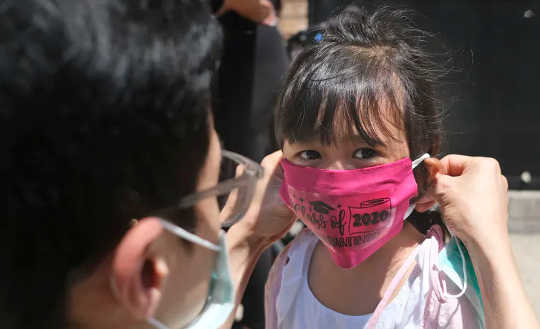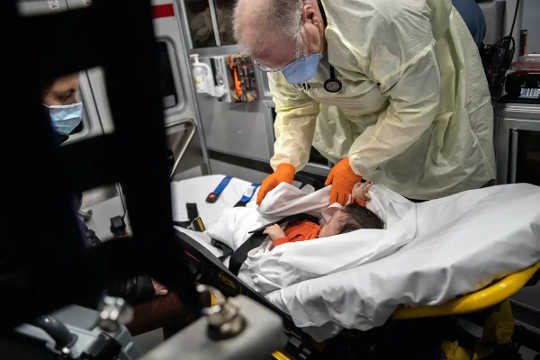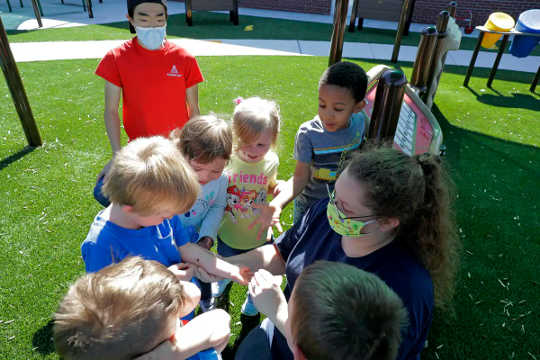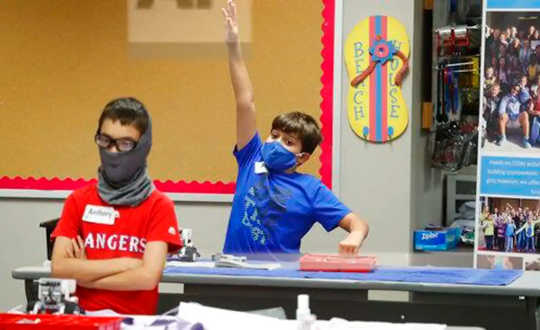 Children are at risk of getting sick from coronavirus and need to practice social distancing and mask wearing too. AP Photo/Seth Wenig, File
Children are at risk of getting sick from coronavirus and need to practice social distancing and mask wearing too. AP Photo/Seth Wenig, File
We are three pediatric infectious disease specialists who live and work in West Virginia. The West Virginia University health system serves 400,000 children and according to our internal data, to date, 2,520 children up to 17 years of age have been tested for the coronavirus. Sixty-seven of them tested positive and one became sick enough to be admitted to the hospital.
We are asked almost daily about children and COVID-19: Do they get COVID-19? Should they attend day care or school, play sports, see friends and attend summer camps? What are the risks to themselves and to others?
Based on current research and our own experiences, it would seem that kids 17 years old and younger face little risk from the coronavirus. Nearly all children have asymptomatic, very mild or mild disease, but a small percentage of children do get very sick. Additionally, there is evidence that children can spread the virus to others, and with huge outbreaks occurring all across the U.S, these realities raise serious concerns about school reopenings and how children should navigate the pandemic world.
 Though somewhat rare, children can get severely ill from the coronavirus and a few have died. John Moore/Getty Images News via Getty Images
Though somewhat rare, children can get severely ill from the coronavirus and a few have died. John Moore/Getty Images News via Getty Images
Get The Latest By Email
Children at risk
When considering the role of children in this pandemic, the first question to ask is whether they can get infected, and if so, how often.
Of the 149,082 reported cases of COVID-19 in the U.S. as of late April, only 2,572 – 1.7% – were children, despite children making up 22% of the U.S population.
But current research shows that children are physiologically just as likely to become infected with SARS-CoV-2 as adults. This discrepancy between case numbers and biological susceptibility may be due to the fact that children generally generally have minimal to mild symptoms when infected with the coronavirus and are therefore less likely to get tested. It also may be that children in general have had less exposure to the virus compared to adults. Kids aren’t going to work, they are probably going out to stores less than adults, and in the states that had relaxed quarantine measures, they aren’t going out to bars or gyms.
Even though children are less likely to get sick from the coronavirus, they are definitely not immune. Data shows that children less than one year old and those with underlying conditions are the most likely to be hospitalized. These kids usually experience the respiratory distress commonly associated of COVID-19 and often need oxygen and intensive care support. As of July 11, 36 kids 14 or younger had died from the virus.
In addition to the typical COVID-19 cases, recently there have been some frightening reports of children’s immune systems going haywire after they are exposed to SARS-CoV-2.
Notable are reports of Kawasaki disease. Normally, Kawasaki disease affects toddlers and preschool children, causing prolonged high fever, rash, eye redness, mouth swelling and swelling of arteries in the heart. The vast majority of children that get Kawasaki disease survive when given treatments that bring down the swelling, but sadly, a few children have died from it, after exposure to the coronavirus led to the disease. Physicians don’t know what causes Kawasaki disease normally or why a coronavirus infection could trigger it.
In the past few months, there have also been reports of some children, after becoming infected with the coronavirus, experiencing fever and rash along with a life-threatening blood pressure drop and sudden severe heart failure. The children and teenagers with this COVID-19-related shock syndrome – now named multisystem inflammatory syndrome in children, or MIS-C – are older than those doctors usually see with Kawasaki disease. Experts think these two illness are not the same, despite having similar features and similar treatments.
 Research shows that kids are able to spread the coronavirus – older children more easily than younger children. AP Photo/Ted S. Warren
Research shows that kids are able to spread the coronavirus – older children more easily than younger children. AP Photo/Ted S. Warren
Children as spreaders
So if kids can catch the coronavirus, the next important question is: How easily can they spread it? Since children have milder symptoms, some experts think that children are probably not the drivers of the COVID-19 pandemic. Additionally, recent research has shown that most kids who catch the coronavirus get it from their parents, not other children.
Small children may have weaker coughs and therefore would release fewer infectious virus particles into their environment. A recent study from South Korea found that while young children seem less able to spread the disease compared to adults, children 10 to 19 years old spread the virus at least as well as the adults do. The lack of evidence that children are major sources of transmission may simply be because the pathway of infection was interrupted due to the nationwide school closures in the spring. As children resume more of their normal daily activities – like school, sports and day care – we just might find the answer to how easily children spread this dangerous virus.
 Should schools reopen if children can get sick from and spread the coronavirus? AP Photo/LM Otero, File
Should schools reopen if children can get sick from and spread the coronavirus? AP Photo/LM Otero, File
So what now?
The evidence clearly shows that all people, regardless of age, can get infected by SARS-CoV-2. While research shows that kids are more resistant to severe illness from the coronavirus, they are still at risk and can spread the virus even if they themselves are not sick.
Given all this information, a question naturally arises: Should schools reopen in the coming weeks? In places where transmission rates are low, reopening schools could be a viable option. But at the present time, in the U.S., new case numbers are surging in most states. This requires a more nuanced approach than a full-scale reopening of schools.
Since young children face low risk of getting seriously ill, are less likely to spread the disease and benefit greatly from in-person interactions, we believe in-school learning should be considered. Opening schools for elementary school children, and coming up with increasingly online options for the older grades, could be one way to approach this thorny problem.
About The Author
Kathryn Moffett-Bradford, Professor of Pediatrics, Division Chief of Pediatric Infectious Diseases, West Virginia University; Martin Weisse, Professor of Pediatrics, West Virginia University, and Shipra Gupta, Assistant Professor of Pediatric Infectious Disease, West Virginia University
This article is republished from The Conversation under a Creative Commons license. Read the original article.
books_health







